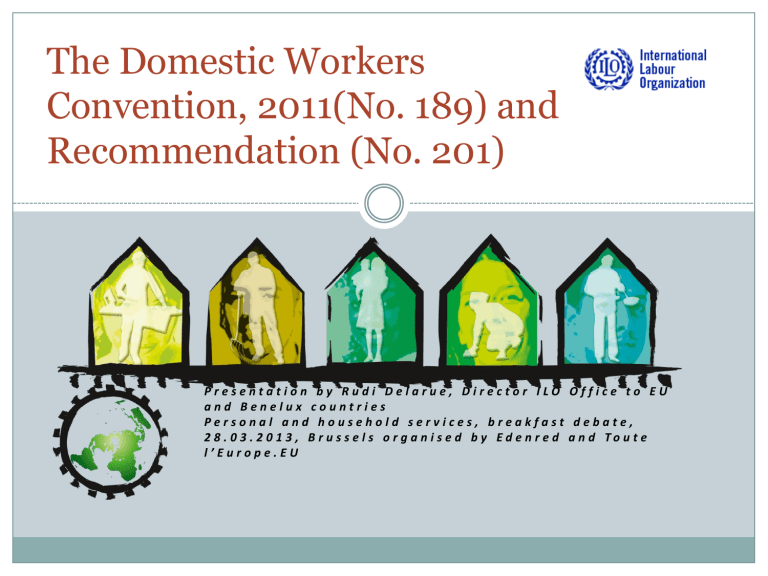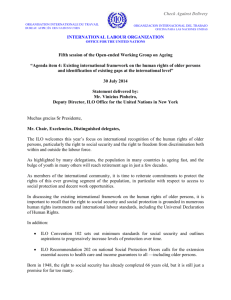The Domestic Workers Convention, 2011(No. 189) and Recommendation (No. 201)

The Domestic Workers
Convention, 2011(No. 189) and
Recommendation (No. 201)
P r e s e n t a t i o n b y R u d i D e l a r u e , D i r e c t o r I L O O f f i c e t o E U a n d B e n e l u x c o u n t r i e s
P e r s o n a l a n d h o u s e h o l d s e r v i c e s , b r e a k f a s t d e b a t e ,
2 8 . 0 3 . 2 0 1 3 , B r u s s e l s o r g a n i s e d b y E d e n r e d a n d T o u t e l ’ E u r o p e . E U
What is the ILO ?
International Labour Organisation (ILO):
Established in 1919
Tripartite (employers, workers and governments)
First specialised UN agency
ILO Office is the secretariat (HQ Geneva; 50 field offices)
Social Justice for a fair globalisation: the decent work agenda
(employment and sustainable enterprises, social protection, fundamental rights and principles at work, social dialogue)
Backed-up by 80 up to date international labour conventions and 80 up to date recommendations
Standard setting, supervisory system, technical cooperation, research and analysis, training
Public Private Partnerships
EU active within ILO and EU-ILO partnership: see http://www.ilo.org/brussels/WCMS_195135/lang--en/index.htm
Why new International Labour Standards on Domestic Workers
• Large segment of the global workforce: 53.6 million workers worldwide in 2010 (83% women)
• Between 1995 and 2010: increase by 19 million
• 3.6% of global wage employment and 7.5% of total female wage employment
• Key for the functioning of households and labour markets
• Decent work deficits: low wages, excessively long hours, safety and health issues, risk of abuse and harassment, discrimination, in worst cases forced labour...
Definitions
• Domestic work broadly defined as
“work performed in or for a household or households”
• A domestic worker defined as
“any person engaged in domestic work within an
employment relationship”
C.189 & R.201 include employees both of households and organizations/service providers
Key standards and approaches
• Measures for ensuring fair terms of employment and
decent working conditions for domestic workers, on an equal footing with other workers
• Promoting formalization of the employment relationship
(contracts, pay slips, time records, …)
• Developing of measures for ensuring compliance with laws and regulations protecting domestic workers
Working conditions
Working time:
• Normal hours, weekly & daily rest, paid leave: towards equal treatment
• Minimum 24 consecutive hours of weekly rest
• Stand-by: to be defined in national law
Remuneration:
• Inclusion in minimum wage coverage
• In kind payments - only limited and under strict conditions
Working conditions
Social security, maternity protection
• Conditions not less favorable than those applicable to workers generally (progressive implementation)
• Simplified payment of social security contributions (including in case of multiple employers)
Health and safety at work
• Measures to ensure occupational safety and health (progressive implementation)
• Protection from harassment, abuse and violence
ILO Strategy and actions on decent work for domestic workers
Awareness-raising on domestic workers’ issues & rights
Strengthening of national institutions
Assisting in preparing policy and legislative reforms and/or programmes
Strengthening of organizations of domestic workers and their employers
Support in respect of ratification and implementation of
C189, & implementation of R201
ILO Strategy and actions on decent work for domestic workers
Ratifications of convention 189 in March 2013:
Italy, Mauritius, Philippines, Uruguay
A lot of preparatory work on-going in many countries:
Analyses and revision of legislation and practices
Consultations on the ratification and ratification procedures under way
EU support:
Within ILO (adoption by June 2011 ILC)
European Commission adopted a proposal for a Council decision authorising EU MS to ratify
EC recommended 27 MS to ratify
Stong EP support (Resolution of May 2011) and EESC support
Wider debate on employment potential of personal and household services
ILO Strategy and actions on decent work for domestic workers
Wide outreach to interested partners
For more information on domestic work see:
http://www.ilo.org/global/topics/domestic-workers/lang--en/index.htm
For more information on ILO and EU see ILO
Brussels website:
http://www.ilo.org/brussels/lang--en/index.htm


